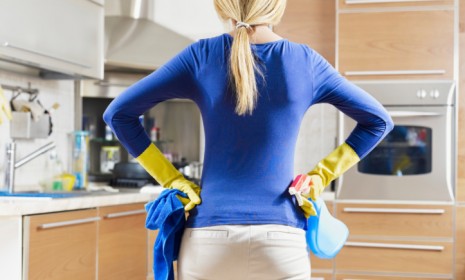Does shared housework really lead to divorce?
A Norwegian study suggests that couples who split chores equally are 50 percent more likely to get separated

A free daily email with the biggest news stories of the day – and the best features from TheWeek.com
You are now subscribed
Your newsletter sign-up was successful
In what sounds like "a slap in the face of gender equality," a new report from Norway finds that couples who divvy up the housework equally are 50 percent more likely to get a divorce than households where the woman handles most of the chores, says Henry Samuel at Britain's Telegraph. Um, seriously? Here's what researchers found:
What exactly did researchers discover?
"One would think that break-ups would occur more often in families with less equality at home, but our statistics show the opposite," says Thomas Hansen, co-author of the study "Equality in the Home." Researchers say the lack of a correlation between gender equality and quality of life was "surprising." The results demonstrate that "the more a man does in the home, the higher the divorce rate."
The Week
Escape your echo chamber. Get the facts behind the news, plus analysis from multiple perspectives.

Sign up for The Week's Free Newsletters
From our morning news briefing to a weekly Good News Newsletter, get the best of The Week delivered directly to your inbox.
From our morning news briefing to a weekly Good News Newsletter, get the best of The Week delivered directly to your inbox.
Why?
It likely wasn't a simple case of cause and effect. Researchers think the correlation might have something to do with modern power couples, in which the woman's high level of education and income make it easier for her to leave the relationship when things get contentious. Also, another issue might be that couples need to establish "very clear roles with lots of clarity... where one person is not stepping on the other's toes," says Hansen. Spouses with overlapping roles in the home can more easily pinpoint where the other person "is not pulling his or her own weight."
Should we really take this study seriously?
When the cases of most Norwegian women are taken into account, the results seem more plausible: Seven out of 10 Norwegian women still do most of the housework and say they're largely happy with the situation. The study might actually make sense, says Dr. Frank Furedi, a sociology professor at the University of Canterbury. Chore-sharing takes place more among middle-class professional couples, where divorce rates are already high. "These people are extremely sensitive to making sure everything is formal, laid out, and contractual. That does make for a fairly fraught relationship." Well, the study did take place in Norway," says Daley Quinn at The Frisky. Studies in other countries suggest that gender equality in the home actually makes couples happier — "and even leads to more sex."
A free daily email with the biggest news stories of the day – and the best features from TheWeek.com
Sources: AFP, The Frisky, The Telegraph